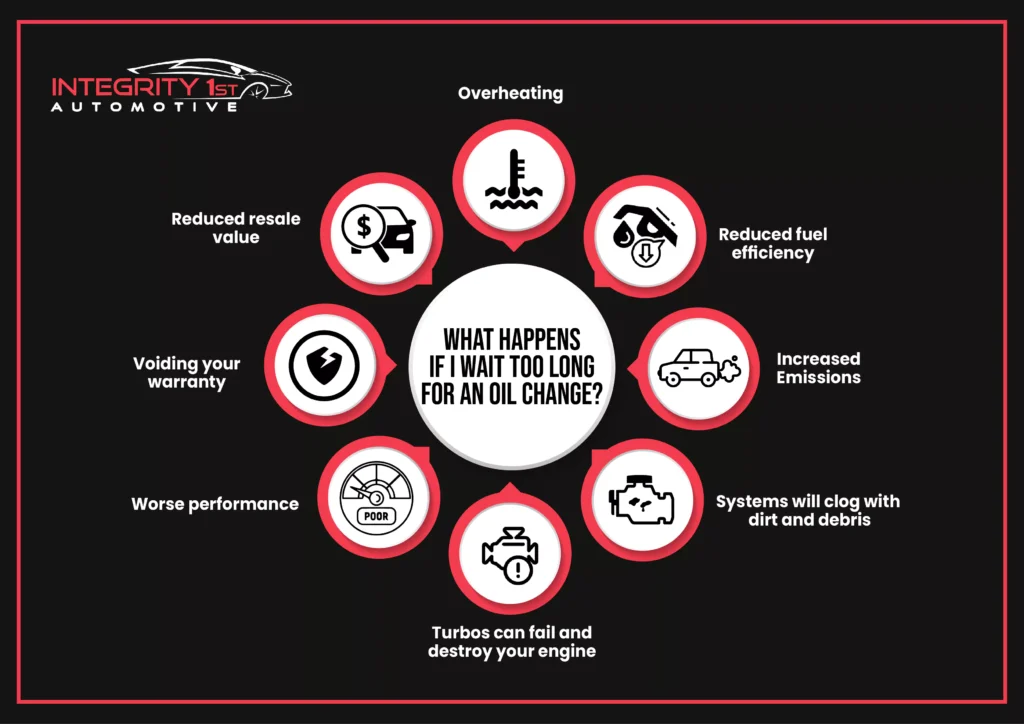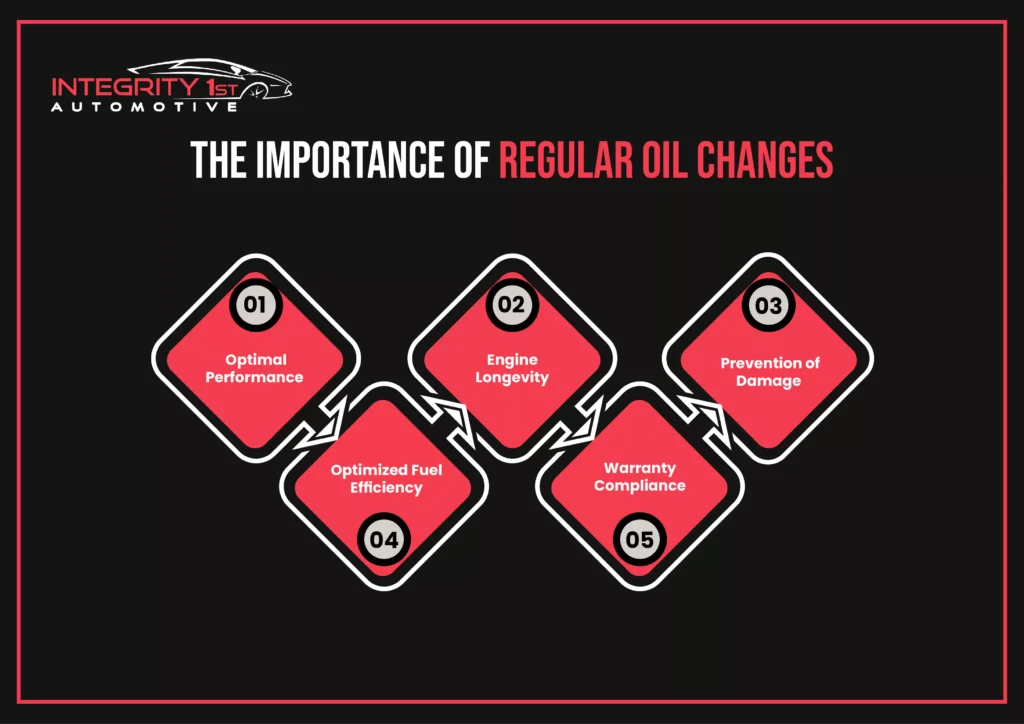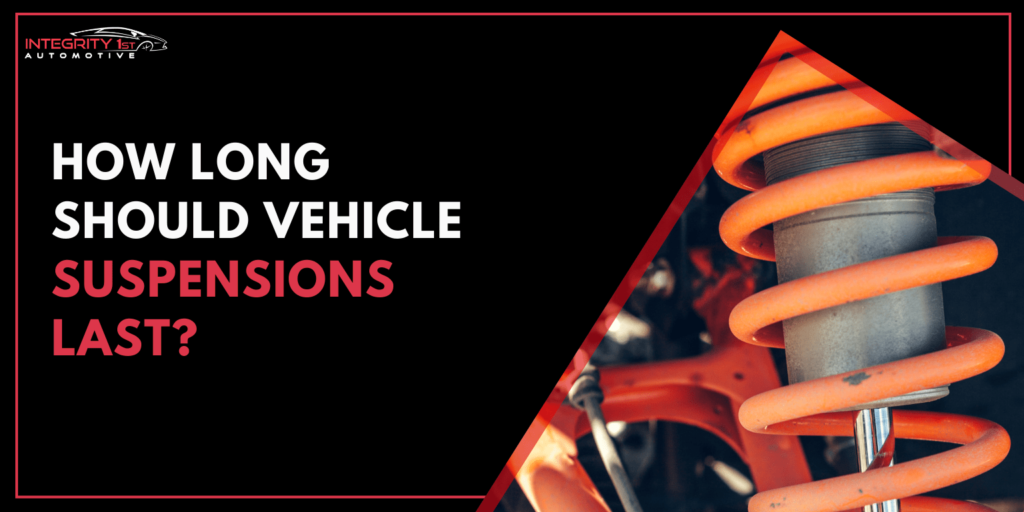If you’re wondering what happens if you don’t change your oil, even if it’s been driven infrequently, this article is for you!
Imagine driving a car for years without ever changing its most vital fluid. Your vehicle needs proper nourishment to function properly, and that nourishment is engine oil. In short, engine oil is the lifeline of your vehicle’s engine and infrequent oil changes may lead to engine damage and costly repairs.
This article will discuss everything that happens to your car if you delay your oil change. Also, we’ll discuss the potential risks of driving without a fresh oil change and the importance of regular oil changes to your vehicle’s performance.
Stay with us!
What Does Engine Oil Do?
Engine oil is the lifeblood of your car’s engine and plays an important role in ensuring your vehicle’s smooth operation. It also prevents minor wear and tear and extends the life of your car.
Here’s a breakdown of the primary functions of an engine oil.

Lubrication
Your engine oil reduces the friction between moving metal parts to prevent excessive wear and tear. This allows your engine to run smoothly and efficiently.
Cooling
Engine oil absorbs the heat generated by the engine’s combustion process and prevents overheating of the engine. This is especially useful during heavy driving or in hot, humid weather.
Cleaning
It also helps remove dirt, debris, and other contaminants from the engine’s internal components, keeping them clean and preventing buildup that hinders performance.
Protection
On metal surfaces, the engine oil usually forms a protective film that shields the metals from corrosion and prevents premature wear.
What Happens If I Wait Too Long for an Oil Change?
Over time, engine oil can break down because of heat, contaminants, and chemical reactions. This may result in increased friction and reduced engine performance.
Above all, infrequent oil changes can also lead to performance issues and sludge formation in your vehicle.
Here’s what happens if you wait too long for an oil change.

Overheating
When you don’t change your oil for too long, it gets old, dirty, and contaminated, and ultimately loses its ability to effectively cool the engine. As a result, your engine overheats, causing serious damage to the engine components.
Reduced Fuel Efficiency
Old oil increases friction between the moving parts of the engine, which requires more energy to overcome. This leads to reduced fuel efficiency and higher fuel costs.
Increased Emissions
The engine that runs on old, dirty oil runs inefficiently. This leads to increased emissions of harmful pollutants, which are dangerous for you and the environment.
Clogged Systems
Sometimes, your system, such as oil filters and oil passages, gets clogged with dirt, debris, and other contaminants, leading to reduced performance and potential engine damage.
Failed Turbos
Failed turbos can destroy your engine as they wholly rely on a steady supply of clean oil for proper lubrication. As a result, there are high chances of catastrophic engine damage.
Performance Issues
Old and dirty oil prevents your engine from running smoothly and effectively, leading to decreased performance and power.
Warranty Void
Most cars come with a warranty. And almost all of the manufacturers require regular oil changes to maintain the warranty. If you fail to change your oil timely, you may void your warranty and bear the consequences.
Reduced Resale Value
A neglected car is worth less when it comes time to sell it. No buyer would want a car with potential engine problems. Therefore, not changing your engine oil will only cost you in the long run with a reduced resale value of your vehicle.
The Importance of Regular Oil Changes
Regular oil changes not only help in proper lubrication and maintain the health and overall performance of your car. It has other key benefits.

Optimal Performance
New and clean oil allows your engine to run smoothly and efficiently. Also, it reduces the noise and vibration of your vehicle. The most important benefit performance-wise is optimal power delivery and acceleration of the vehicle.
Engine Longevity
Oil acts as a protective barrier for your engine and protects engine parts from friction, corrosion, dirt, and debris. As a result, it increases the lifespan of your engine and prevents it from catastrophic engine failures.
Prevention of Damage
Regular oil change helps regulate the engine temperature and prevents overheating, leading to serious engine damage. Also, it prevents sludge formation and keeps your engine passages and oil filters unclogged.
Optimized Fuel Efficiency
A well-lubricated vehicle prevents friction and improves fuel efficiency. Also, it operates more efficiently, leading to better fuel economy.
Warranty Compliance
Your vehicle manufacturer may require regular oil changes to maintain the warranty. Therefore, it’s important to schedule oil changes as per the manufacturer’s guidelines to avail warranty and save some bucks on engine repairs.
What are the signs that suggest an oil change?
Noticing the warning signs is the first step to making a responsible decision. Here are some common signs that suggest an oil change.
- Unusual engine sounds
- Dirty or grimy oil
- Low oil levels
- Dashboard warning lights
- Abnormal vibrations
- Burning smell
- Clunky gear shifts
If you notice any of the above-mentioned signs, always seek professional help and schedule an oil change as soon as possible. Ignoring these signs may lead to more serious damage and costly repairs.
We, at Integrity 1st Automotive, offer professional and reliable oil change services that ensure your vehicle runs smoothly and effectively.
How Often Should You Change Your Oil?
The recommended oil change interval depends on many factors, including your vehicle’s specific requirements, your driving habits, and the type and viscosity of oil used. Therefore, it’s always best to consult your vehicle’s owner’s manual for correct guidelines.
Moreover, you can also consult professional technicians and mechanics at Integrity 1st Automation for a free consultation about your routine oil changes.
Remember: Neglecting oil changes can have severe consequences for your engine’s health and longevity. So, never ignore the warning signs!
Let’s Get You an Oil Change
No idea where to get an oil change? No issues!
The expert team at Integrity 1st Automotive is skilled enough to offer comprehensive vehicle diagnosis while assessing your car’s overall condition.
We can help you with routine oil changes, tune-ups, brake inspections and repairs, tire rotations and balancing A/C services, and everything related to automotive.
Contact us now for a free consultation and experience the ride of your dreams with Integrity 1st Automotive.
Conclusion
Oil is like the lifeblood of your engine. Without it, it will barely operate or function well. Therefore, to get your vehicle up and running smoothly and efficiently, it’s important to get your oil changed as per your manufacturer’s guidelines.
Without routine oil changes, you may experience performance issues, clogged systems, and failed turbos, leading to more severe engine problems in the future.
Changing your engine oil can be the most simplest yet crucial routine maintenance you’ll NEVER regret doing. Depending on your vehicle, you can perform oil changes in your garage if you’re well-equipped. However, if you have minimal skills and knowledge, we recommend doing it from a professional.
At Integrity 1st Automotive, we offer premium services at affordable rates to ensure your car’s health and performance. Visit or contact Integrity 1st Automotive for a professional diagnosis and expert solutions.
FAQ
What Happens If You Don’t Change Your Oil?
If you don’t change your oil, your vehicle may experience:
- Increased friction
- Wear and tear
- Overheating
- Reduced performance
- Decreased fuel efficiency
- Engine noise
- Engine damage or failure
What To Know Before Getting An Oil Change?
Here are a few things you should consider before getting an oil change:
- The quality of engine oil should meet the manufacturer’s recommendations
- Always replace the oil filter with each oil change
- Monitor your oil levels using a dipstick. Avoid overfilling the tank
Is my oil changed during a service?
Yes, all professional service providers, including Integrity 1st Automotive, perform oil changes in a service.
How long can you go without an oil change?
It is usually recommended to change your oil every 3,000 to 5,000 miles. However, it depends on many factors, including your oil type, driving habits, and vehicle’s manufacturer’s specifications.
How many miles can you go over an oil change sticker?
It’s never recommended to exceed the mileage on your oil change sticker.
What happens if you don’t change your oil for 10,000 miles?
It may result in increased wear and tear, reduced engine performance, increased fuel consumption, and engine failure.




